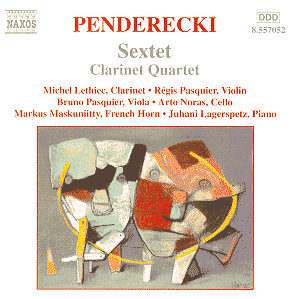This is a laudable enterprise. Although there
is some overlap, it acts as a fine complement to CPO’s
Penderecki chamber disc. The standard of performance on the
Naxos disc is just as high, although the presentation perhaps
less so. It is interesting that Bernd Dief’s translation of Richard
Whitehouse’s notes covers all the pieces on the disc; Whitehouse’s
actually provides details for one which is not, the Three Miniatures
for Violin and Piano of 1959. Given that there is still 12 minutes
or so of available playing time left on the disc (assuming an
eighty minute maximum), perhaps these were originally intended,
but for some reason lopped off?.
The Sextet is scored for Clarinet, Horn,
Violin, Viola, Cello and Piano and is immediately approachable.
One could easily listen to the first movement for pure pleasure
rather than some higher aesthetic purpose. There is something
distinctly Stravinskian about some of the writing (Soldier’s
Tale), and certainly something identifiably cheeky. All parts
appear to be of equal importance, and Naxos has assembled six
strong personalities. This is very rhythmically alive playing,
dynamic and often revealing a comic side to the argument of the
first movement. The second movement, at over 20 minutes’ duration,
is in contrast hyper-intense and bleak. Penderecki’s expertly
considered scoring does not cushion anything, although he does
find space for some carefully timed Romantic gestures. Of the
soloists, the eloquent hornist and the clarinettist (lovely, liquid
lines) should very definitely be mentioned. This is a major chamber
piece, tightly composed, well recorded (analytic but not too far
forward) and worthy of frequent return visits.
The disc seems to be laid out so that scoring
becomes progressively less piece by piece. So from Sextet we go
to the Clarinet Quartet, premiered in Lübeck in August 1993.
Michel Lethiec had hinted at his abilities in the Sextet – here
they are displayed in all their glory. The beautiful pianissimo
of the opening ‘Notturno’ line is very affecting, and very delicate
(even if peace is some way away from this music). Again I must
take issue with the booklet notes in the case of the second movement.
The opening repeated patterns are not ‘aggressive’ (at least here),
although the clarinet response does come close to being ‘strident’.
My only criticism of the Serenade (Tempo di valse) is that it
is too short. The finale is as long as the first three movements
put together. A sustained elegy typical of Penderecki, this performance
successfully projects the loneliness of some of the solos. Memorable.
Moving back in time nearly forty years, the Three
Miniatures for Clarinet and Piano are brief yet full of delight.
There is a Bartókian feel to the first. Its playfulness
contrasts with the hushed ‘Andante cantabile’ (again, Lethiec
is exemplary here), itself leading perfectly to the dynamic blink-and-you-miss-it
finale.
Two works for solo instruments round off the
disc. The Divertimento for Solo Cello was written in 1994
for Mstislav Rostropovich, and it is true one wishes for him here.
Yet Noras is no beginner in this field (his recording of the Penderecki
Cello Concertos for Finlandia, with the Sinfonia Varsovia conducted
by the composer on 8573-85575-2 is excellent)
and he enters well into the elegiac world of the opening ‘Sarabande’.
Although the Scherzo holds no technical terrors for him, it is
in the sonorous, plaintive lament that is the final ‘Notturno’
where he triumphs.
The 1987 Prelude for Solo Clarinet is
a fortieth birthday tribute to fellow composer Paul Patterson.
Marked ‘Lento sostenuto’, it works its way from tentative beginnings
through a hypnotic soundscape until it leaves the listener hanging
in the air. It is a haunting work and it is easy to see why Naxos
chose to close the disc with it.
There is much rewarding listening here. Recommended.
Colin Clarke
